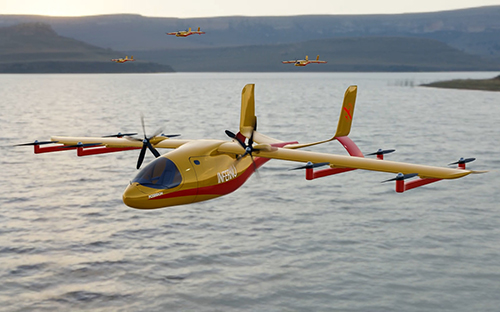A team from the Aerospace Engineering study programme at the University of Stuttgart, in Germany, has presented a concept for a hybrid firefighting aircraft that combines the advantages of fixed wing and rotor blades. With its design ‘Inferno’, the team won this year’s Design Challenge from the German Aerospace Centre (DLR).
Firefighting aircrafts are filled up with water at an airport or at large lakes and take it quickly and efficiently over long distances to where the fire is. The disadvantage, since the propellers are designed for forward flight, a lot of space is needed for take-off and landing or for water intake which limits the aircraft’s capabilities. Helicopter rotor blades, on the other hand, are horizontal and allow pilots to descend vertically over a small lake or even swimming pools to collect water.
In addition, a helicopter can hover in the air and accurately drop extinguishing water over the source of the fire. This makes helicopters more flexible, but they are also slower and consume considerably more energy.
With the risk of forest fires increasing globally due to climate change the DLR Design Challenge aimed to address this issue. The organisers called for teams to deliver systematic designs featuring optimal interaction, with both units on the ground and a fleet of aircraft, to help maximise the amount of water transported to fire sites.
“Current media reports on climate change and the associated increase in forest fires show us just how important it is to take action,” said Markus Fischer, DLR Divisional Board Member for Aeronautics and Chair of the DLR Design Challenge jury. “Through their engagement with the topic, the students who took part in the competition have put forward some striking ideas for what highly effective forest firefighting could look like. The winners will all have had the experience of competing as part of a team and will be able to draw upon their personal achievements within a group.”


